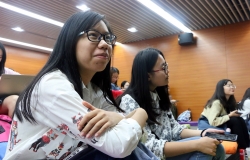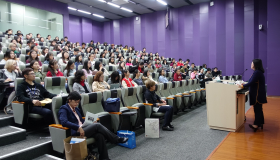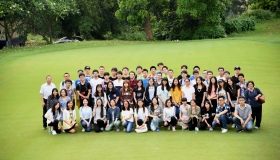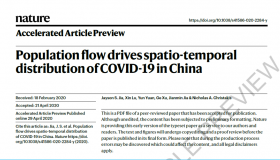10 Lectures for a Fresh Undergraduate @HSS Lecture 6 : Translation-A Brief History

Like Francis Bacon said, “Histories make men wise”. By learning history, we may get a better view of the world we live in.
In order to encourage the students to think deeper, Prof. Wang started the talk by introducing Benedetto Croce’s view “Every true history is contemporary history” and asked the students to express their ideas about this point. Three Year 1 students shared their understanding, including Zhong Hanxiao from SME.
In his eyes, to illustrate the history about Translation, Prof. Wang mentioned the Tower of Babel and the Rosetta stone. The Tower of Babel is an origin myth meant to explain why the world's peoples speak different languages.
The Rosetta stone was discovered by Napoleon’s troops near the seaside town of Rosetta in lower Egypt in 1799 and eventually made its way into the British Museum where it resides today. It is a slab of black basalt dating from 196 B.C. inscribed by the ancient Egyptians with a royal decree praising their king Ptolemy V. The inscription is written on the stone three times, once in hieroglyphic, once in demotic, and once in Greek.

In China, translation can be dated back to about 3000 years ago when different ethnic groups talked to each other with interpreters’ help, according to The Book of Rites or Liji. However, the significant demand for translation was driven by introducing Buddhist Scriptures to China from Han Dynasty. While in the west, translation started as a holy cause - Biblical translation, for example, from Hebrew, Latin or Greek to English, like Septuagint, Vulgate.
In modern Chinese history, translation played an important role. Chinese scholar and translator Yan Fu was most famous for introducing Western social, economic and political ideas, including Darwin's "natural selection", to China in the late 19th century.

In addition, Prof. Wang took some examples on the differences in wide ranges of culture to illustrate one of the significant concepts of adaptation and accommodation. To name a few, the English word “fan” could be given distinct meanings in Chinese, for one, “fan” could refers to the vermicelli made from bean starch; For another, it is a substantive reference to follower or enthusiast of somebody or something. To this end, Prof. Wang indicated that translation and interpretation is an old but emerging cause in China and told us that it is of bright future for students who determined to peruse their career as language servicers, who would compatibly capable in dealing with hard but rewarding jobs, so as to follow their personal dreams and goals.
Finally, Prof. Wang made supplementary remarks and proposed that human beings are far more intelligent than artificial intelligence to date, which could be useful and adequate instruments for mankind but will never replace English education. To sum up, it is extremely worth to believe that learning lessons from history is the true essence of development and advancement of future translation, even though it's a long way to go.










